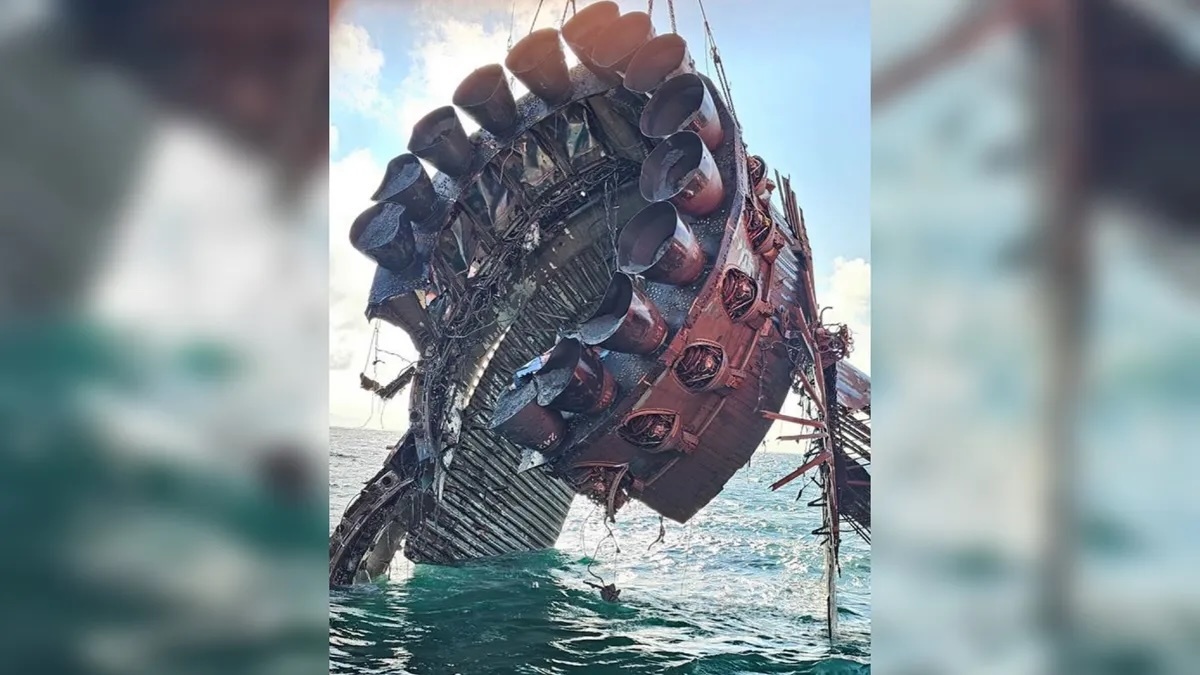25.09.2024
'Like the ruins of a futuristic, long-dead civilization.'

Part of the Super Heavy first-stage booster that launched on the fourth SpaceX Starship test flight, which occurred on June 6, 2024. Elon Musk posted this photo on X on Sept. 22, 2024. (Image credit: Elon Musk via X)
SpaceX has pulled some pieces of its Starship megarocket from the sea.
On Sunday evening (Sept. 22), SpaceX founder and CEO Elon Musk posted on X a photo of dripping and damaged rocket hardware being lifted out of the ocean. The mangled metal is part of the first-stage booster that flew on the most recent Starship test flight, Musk said.
"Like the ruins of a futuristic, long-dead civilization," he wrote in another post a few hours later.
SpaceX is developing Starship to get people and payloads to the moon, Mars and beyond. The vehicle consists of two stainless-steel elements — a huge first-stage booster called Super Heavy and a 165-foot-tall (50 meters) upper-stage spacecraft called Starship, or just Ship.
Both of these stages are designed to be fully and rapidly reusable, and both are powered by SpaceX's powerful new Raptor engines — 33 for Super Heavy and six for Ship.
Starship, which stands 400 feet tall (122 meters) tall when fully stacked, has flown four test flights to date, all of them from SpaceX's Starbase site in South Texas. These missions lifted off in April and November of 2023 and March and June of this year.
The Super Heavy piece featured in the newly posted photo is from the June liftoff, which SpaceX declared a complete success. Ship reached orbital velocity, and both it and Super Heavy survived their descent through Earth's atmosphere, hitting the waves intact — Ship in the Indian Ocean and Super Heavy in the Gulf of Mexico.
But those splashdowns did some damage, as the newly posted photo shows. The hunk of Super Heavy featured in the image sports 14 Raptors; it's unclear if SpaceX collected the other 19 as well, or if those engines are still resting on the ocean floor.
It's also unclear why SpaceX went to the trouble of salvaging the hardware from the sea; Musk did not provide a reason in his X posts.
"Some SpaceX watchers are speculating it could be after the booster's engines as part of its research to glean additional knowledge or simply to ensure they don't fall into the hands of rival companies or other countries," Brandon Lingle of the San Antonio Express-News wrote in an article published on Sunday.
That piece told the story of a group of independent filmmakers who heard about the Super Heavy recovery operation in the Gulf and chartered a boat to observe it.
SpaceX is gearing up to launch Starship's fifth test flight. The company says that it's been ready to fly since early August, but it likely won't get approval from the U.S. Federal Aviation Administration (FAA) until late November. The FAA says it needs more time to assess the launch's potential environmental impact and to review modifications to the Starship vehicle and flight plan that SpaceX made after Flight 4.
Quelle: SC
